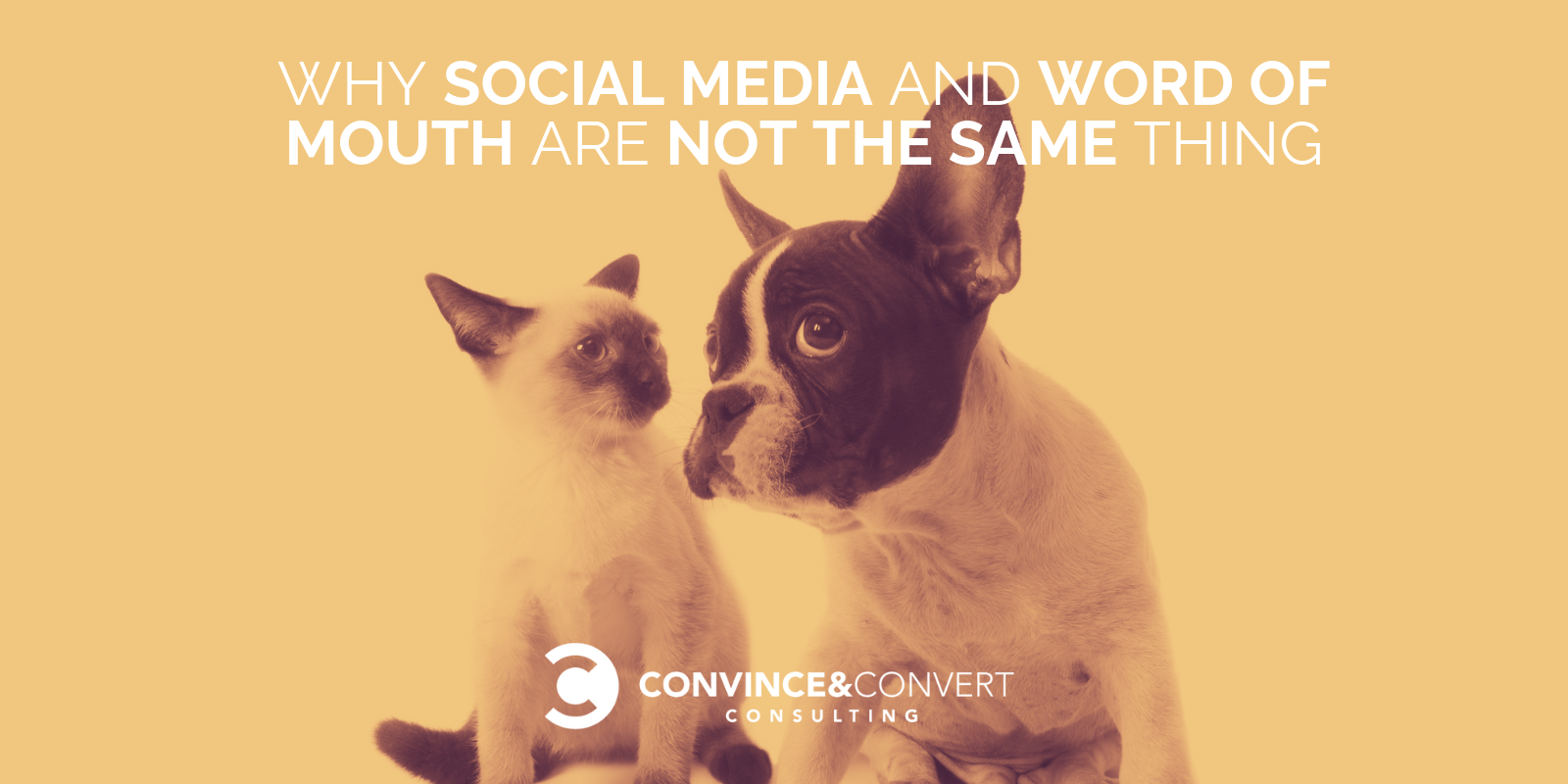
Social media itself isn’t word of mouth — it’s one way that word of mouth spreads. #wordofmouth Click To Tweet
In our social media-dominated world, most people have the impression that word of mouth has transitioned from in-person conversations to retweets and direct messages. They believe that social media IS word of mouth. Not true.
Social media garners plenty of attention and marketing budgets. But offline chatter is an equal, and sometimes more impactful, driver of awareness and preference.
It’s not that social media and online word of mouth don’t matter; they do. In fact, half of all word of mouth takes place online. However, research shows that offline word of mouth is more persuasive. According to a study by the Keller Fay Group, 50 percent of consumers say they are very likely to make a purchasing decision based on a real-life conversation. Meanwhile, 43 percent of consumers feel the same way after an online discussion.
It’s also important to understand that social media itself isn’t word of mouth; it’s one way that word of mouth spreads. Word of mouth is a story or verbal recommendation. Social media is a conveyance mechanism for that story. So is a review. So is a phone call. So is a conversation.
Thus, having a popular Instagram account is not the same as using thoughtful word of mouth. Likes and comments are quite different and less effective than word-of-mouth recommendations.
The Math on Why Word of Mouth Matters
A single recommendation from an influencer spreads at an annual rate of eight factorial, according to Ted Wright, author of Fizz. Setting aside any complex math, a single recommendation passed from person to person over the course of a year ultimately reaches a total of 40,370 people. In other words, that recommendation from one person impacts 40,369 other potential customers.
We have LOTS more research on word of mouth in our new study, Chatter Matters: The 2018 Word of Mouth Report.
What business wouldn’t want to cultivate these conversations and quickly multiply the number of people passing along positive recommendations? In spite of this potential, relatively few companies — think less than 1 percent — have an actual plan for word-of-mouth marketing.
Instead, most businesses are putting all their eggs in the social media basket. Social media budgets in the U.S. are projected to jump from $4.3 billion in 2012 to more than $23 billion in 2019. Even with this eye-popping spending spree, social media remains less effective than traditional person-to-person exchanges when it comes to word of mouth.
Offline conversations are incredibly powerful, though these discussions are difficult to track for your average marketing team. It’s hard to know if and when these comments happen. Jonah Berger, the author of Contagious, explains word of mouth perfectly:
You can shape it, you can encourage it, you can drive it, but you can’t buy it.
This might make it seem like generating word of mouth is impossible, but there’s a secret weapon for creating these organic conversations: talk triggers.
Give Them Something to Talk About
Establishing impactful word of mouth begins with giving people something they cannot help but talk about. It could be as simple as a cookie on a hotel pillow, funny hold music, or an unusually extensive menu.
Establishing impactful word of mouth begins with giving people something they cannot help but talk about. #TalkTriggers Click To Tweet
These talk triggers are noteworthy experiences that your customers will rush to share with their friends and family members. Those people will then share that same story (or at least a close approximation of it) with their friends.
The good news? Your talk trigger can be just about anything. The only real criterion is that it must be remarkable enough to get noticed.
Confused about what is and isn’t a talk trigger? We talk about the four requirements for a talk trigger in my new book, written with Daniel Lemin:
A talk trigger must be:
- Remarkable
- Relevant
- Reasonable
- Repeatable
An Example of a Talk Trigger
One talk trigger with incredible longevity comes to us courtesy of the banking world. In this seemingly unremarkable industry where every bank offers pretty much the same services as the next one, brands must truly do something noteworthy to get people talking.
Umpqua Bank, headquartered in Portland, Oregon, is one of the 50 largest banking chains in the U.S. Each of Umpqua’s more than 300 locations prominently displays a silver telephone in its lobby. Since 1994, any customer can pick up one of these phones to be instantly connected with the company’s CEO. Not the manager of the branch or even the region — a direct line to the leader of the company.
Moving Beyond Social Media Buzz
Getting people talking and earning word-of-mouth recommendations involves more than chance — it requires a strategic plan. Andy Sernovitz, co-founder of the Word of Mouth Marketing Association, encourages marketers to see social and offline as valuable but different tools. Social is useful in that it is instantly shareable, but offline truly shines for its credible repeatability.
There’s nothing wrong with pairing the yin with the yang — offline and social in this case — but truly effective word-of-mouth marketing requires a lot more than a few buzzworthy tweets. Instead of throwing the bulk of your marketing dollars into the social media abyss, invest some of your valuable resources into creating truly noteworthy experiences. Your customers will be enamored, and their real-life networks will be more than happy to spread the word.
For more information on Talk Triggers, visit the official site, packed with free resources.
And, our team at Convince & Convert helps interesting brands create their own word of mouth strategy.